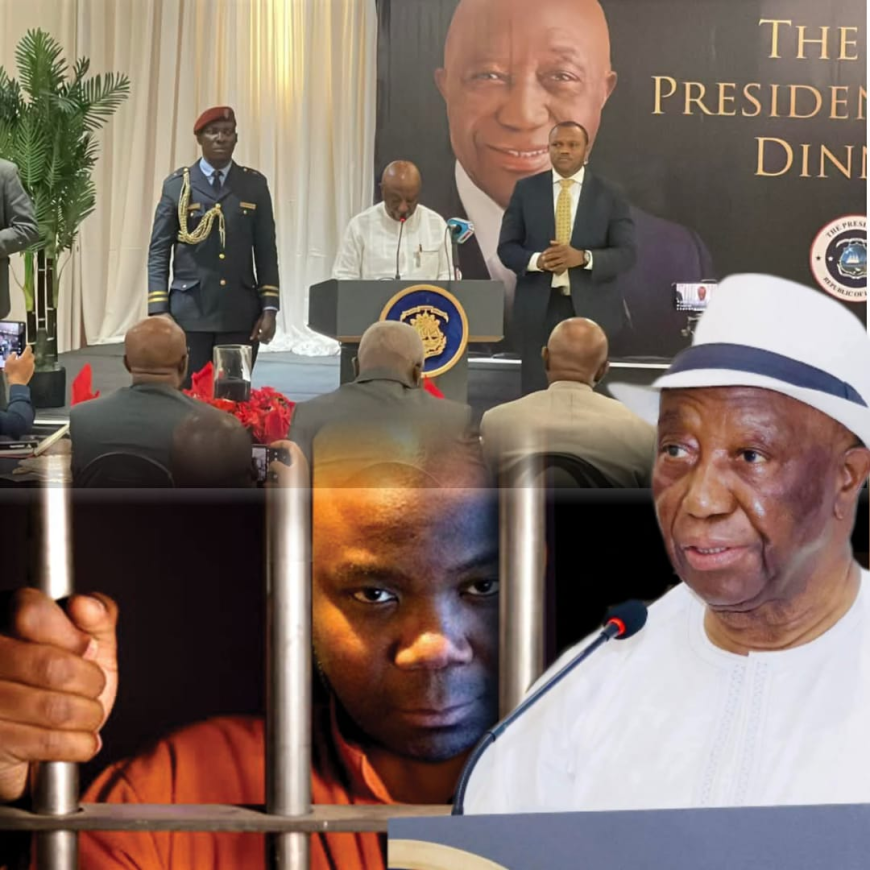“No More Press Suppression,” President Boakai Commits To Upholding Media Protection Amid Mounting Press Freedom Concerns

Monrovia, Liberia: In a renewed push to foster a safer and more dignified media landscape across Liberia, President Joseph Nyuma Boakai has committed his administration to upholding the rights of journalists, ensuring their safety, and confronting the systemic barriers that have long endangered press freedom in the country.
Speaking at the Presidential Media Dinner held on Thursday, April 10, 2025, at the EJS Ministerial Complex in Congo Town, President Boakai pledged his government's support to safeguarding press freedom and addressing the persistent threats faced by journalists nationwide.
The dinner brought together dozens of media executives, journalists, and government officials, marking a symbolic turning point in the administration’s evolving relationship with the press.
“In this administration, there will be no political prisoners and press suppression,” President Boakai said firmly.
Drawing a sharp contrast between his leadership and the troubling experiences of journalists in previous regimes and now, “The media must be respected, protected, and empowered,” the Liberian leader emphasized.
The president’s remarks come against a backdrop of fresh reports highlighting press freedom challenges during his first year in office.
Since taking state power in January 2024, at least 13 separate cases of journalist harassment, threats, or unlawful detentions have been documented by local watchdogs and media rights groups.
Most of these incidents reportedly occurred in counties outside Monrovia, where enforcement of rights remains fragile and inconsistent.
Acknowledging these realities, President Boakai termed them as “unacceptable” and promised the imminent rollout of a national press safety framework to address structural vulnerabilities in the media sector, especially for reporters operating in rural areas.
His statement followed years of consistent press freedom setbacks across Liberia, with more than 40 documented cases of press intimidation occurring under the former President George Weah administration between 2018 and 2023, including assaults, arbitrary arrests, and media censorship.
Under former President Ellen Johnson Sirleaf’s presidency, although Liberia was hailed as a post-conflict success story, the media landscape was far from free, with incidents of media shutdowns and the frequent use of libel suits against critical journalists, underscoring the persistent threats to press independence during her time in office.
Liberia currently ranks 60th on the 2024 World Press Freedom Index, falling four places due to concerns over institutional impunity, physical attacks on reporters, and inconsistent government responses.
According to recent data from the Press Union of Liberia and corroborated by Human Rights Watch, at least 13 incidents involving threats or violence against journalists have occurred since President Boakai’s ascendency to office.
Eight of these took place within the last six months, as reporters covering land disputes, corruption cases, and county politics have increasingly faced interference, often at the hands of local authorities or security forces.
The president took a notably direct tone, recognizing that the prevailing threats against press freedom are not just limited to Monrovia. “We must ensure journalists are protected not only in Monrovia, but in Nimba, Maryland, Lofa, and across every county in this republic,” he intoned.
Despite President Boakai’s assurance, challenges persist. A February 2025 survey by the Liberia Media Accountability Project revealed that 72% of journalists feel unsafe when covering governance issues, and only 28% believe the government would intervene to protect them in the event of threats or physical attacks.
President Boakai, for his part, acknowledged the need for deeper reforms and urged media institutions to recommit to ethics, fact-checking, and professional rigor. “Let us build a society where facts matter, where truth prevails, and where integrity leads,” he urged.
What's Your Reaction?









































































